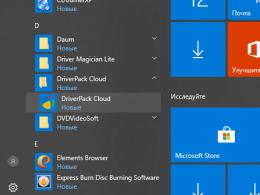Information search cloud. How to get free gigabytes in cloud storage
Today, cloud storage is an integral part of our lives. Many people and organizations store their files there, thereby ensuring their safety and security, as well as the convenience of access to them by various users, comfort in work. At the same time, the functionality of these services in 2018 may differ in the presence (or absence) of any essential elements for cloud services, inspiring the user to make a choice in favor of the most convenient of them. In this article, I will tell you what free cloud storages with a large amount of memory are in this year 2018, describe the features of their functionality, and also explain how to work with them.
Exploring cloud storage with large volume for free 2018Varieties of cloud storage with a large amount of storage offered
Nowadays, there are a sufficient number of cloud services on the network that offer users their services for hosting and storing user files. However, these services are different:
- by the amount of paid and free space provided;
- on the possibilities of encrypting data located in the cloud;
- by the speed of working with them;
- if possible, support the service on mobile devices (in the form of specialized applications);
- early recovery if possible deleted files, the presence of a built-in media player, support for various languages, and so on.
At its core, cloud storage works on a similar principle. You go to such a storage, register there, and get a predetermined amount of empty space for your needs. You can upload and download files from there, share links to these files with the right people, view them, and perform other relevant actions.
Many storages support file synchronization: for example, a folder is created on your PC into which you copy required files, and these files will be automatically copied to the cloud service.

I also note that over the past couple of years, the leading market players have been pursuing a policy to reduce the space provided to the user for free. In particular, in 2016, Microsoft reduced the amount of free space provided in its OneDrive from 15 gigabytes to 5 gigabytes. Other well-known players are pursuing a similar policy, significantly reducing the amount of free space on their resources.
The best cloud storage for free
Consider cloud services free services which we can use.
Service "pCloud" - allows you to store and send large files
- To get started with the service, follow the link above and go through the registration procedure.
- After completing the procedure, you will be taken to the Yandex.Disk workspace, where you can create directories, upload files to them, delete files, provide them with the desired folder general access etc.
 Working window "Yandex.Disk"
Working window "Yandex.Disk" Cloud.Mail.ru service
Cloud Mail.ru is another well-known cloud service with a large volume from Mail.ru. 8 gigabytes of free space is provided free of charge. Supports work with shared folders, two-factor authentication, editing documents online, automatic, selective synchronization and other functions.
To work with data cloud service follow the link, go through authorization (if necessary), and start using pretty classic cloud functionality.
 Working window "Cloud Mail.ru"
Working window "Cloud Mail.ru" Service «Degoo»
The Degoo service offers as much as 100 gigabytes of free space, while this is not a standard cloud service, but a cloud storage service backups files.
- It does not support file sync.
- Does not allow you to share your files with friends.
- Does not support scheduled file copying.
- There are no other relevant bonuses in it that are available to the usual cloud service.
 Degoo work screen
Degoo work screen At the same time, you can connect many devices to Degoo, including a laptop and a mobile phone. Scheduled backups are not available here, but the service automatically copies files once every 24 hours.
To work with the service, follow the link, download this application to your device and start using its functionality. Working with file uploads with this service also will not cause you any problems, try this cloud storage for free.
Conclusion
This article described the best, in my opinion, cloud storages with a large amount of data that provide free functionality in 2018. In terms of overall functionality, the pCloud service is one of the best in its segment, so I recommend users to directly verify the multifunctional capabilities of this service. It is also worth looking at the other alternatives I mentioned above, they all provide solid amounts of disk space for free for their user.
To exchange files between computers and mobile gadgets, cables and flash drives are no longer needed. If the devices have Internet access, files can "fly" between them "on the cloud". More precisely, they can "settle" in cloud storage, which is a collection of servers scattered around the world (combined into one virtual - cloud server), where users place their data for a fee or for free. In the cloud, files are stored in exactly the same way as on a computer hard drive, but are available not from one, but from different devices who are able to connect to it.
Every second or third Internet user has already taken the technology cloud storage data into service and enjoys using it, but someone is still saved by flash drives. After all, not everyone knows about this possibility, and some simply cannot decide which service to choose and how to use it. Well, let's figure it out together.
What are cloud storages from the user's point of view and how they work
If you look through the eyes of an inexperienced user, cloud storage is regular application. All it does is create a folder on the computer under its own name. But not simple. Everything that you put into it is simultaneously copied to the same cloud-based Internet server and becomes available from other devices. The size of this folder is limited and can grow within the limits of the disk space allocated to you (from 2 GB on average).
If the cloud storage application is running and the computer (mobile gadget) is connected to global network, data on the hard drive and in the cloud are synchronized in real time. At battery life, and also when the application is not running, all changes are saved only in local folder. When the machine is connected to the Internet, access to the storage becomes possible, including through a browser.
Files and folders uploaded to the cloud are full-fledged web objects, the same as any content of Internet sites and ftp storages. You can link to them and share links with other people, even those who do not use this service. But only those who you yourself have allowed to download or see an object from your storage will be able to. In the cloud, your data is hidden from prying eyes and securely protected with a password.
The bulk of cloud services have additional functionality - a file viewer, built-in document editors, screenshot tools, etc. This, plus the amount of space provided, creates the main differences between them.

— a cloud storage service that needs no introduction Windows users. No wonder, because in the latest releases of this OS (in the "top ten") it really climbs on top of everything on the screen, as it is set to autorun by default.
Benefits for Windows users Microsoft service OneDrive in front of analogues, perhaps, only one thing - it does not need to be installed. Also no need to create for it separate account- to enter the cloud, it is enough to enter the data of your account Microsoft.
The owner of one Microsoft OneDrive account provides 5 GB of free disk space to store any information. To get extra volume, you have to pay extra. The maximum is 5 TB and costs 3,399 rubles per year, however, this package includes not only disk space, but also Office application 365 (home release). More democratic tariff plans are 1 TB (2,699 rubles per year - storage and Office 365 personal) and 50 GB (140 rubles per month - only storage).
Additional features all rates:
- Support for other operating systems - Mac OS X, iOS and Android.
- View and edit documents using built-in applications Office package.
- Remote access to all contents of the computer (not just the OneDrive folders) on which the service is installed and your account is used Microsoft entry.
- Creation of photo albums.
- Built-in messenger (Skype).
- Creation and storage of text notes.
- Search.
Only paid versions:
- Create expiration links.
- offline folders.
- Multi-page scanning with saving documents to a PDF file.
In general, the service is not bad, but sometimes there are problems with logging into the account. If you are going to use the web version of the repository (through a browser) and access it under a different IP address than you used to, Microsoft will sometimes run a verification that the account belongs to you, which takes quite a lot of time.
There were also complaints about the removal of user-generated content from OneDrive - when Microsoft suspected that it was unlicensed.

is one of the oldest cross-platform cloud storages. Unlike the previous one, it supports all major Operating Systems, as well as some rarely used, such as Symbian and MeeGo. The service is very easy to use, works quickly and stably.
For free, a DropBox user is provided with only 2 GB of disk space for storing personal files, but this amount can be doubled by creating and attaching another one to your account - work (which can actually be personal). Together you get 4 GB.
Switching between personal and work disk space on the DropBox website and in the application is carried out without logging out of your account (you do not need to enter your login and password every time). A separate folder is created on the computer for both accounts - 2 GB each.
DropBox, as expected, also has several tariff plans. Free was mentioned above, Paid is "Plus" (1 TB, $ 8.25 per month, intended for personal use), "Standard" (2 TB, $ 12.50 per month, for business), "Advanced" (unlimited volume, $20 per month for 1 user) and "Enterprise" (unlimited volume, individually set price). The difference between the last two lies in the set additional options.
Free users in addition to the storage available:
- DropBox Paper Document Collaboration Service.
- Ability to share links and create shared folders.
- Log of file changes with the ability to restore them to previous version(up to 30 days).
- Commenting on files - both your own and other users, if the file is available for viewing.
- Search function.
- Receive event notifications (configurable individually).
- Automatic download photos from the camera (by the way, for enabling this option some time ago, DropBox provided users with additional space).
- Choice of full or selective synchronization.
- Data encryption during storage and transmission.
The possibilities of paid tariffs can be listed for a very long time, so we will note only the main ones:
- Remote destruction of data from DropBox on a lost or stolen device.
- Link expiration date.
- Two-factor account authentication.
- Setting access levels to different data.
- Enhanced information security class HIPAA / HITECH (secure storage of medical records).
- 24/7 technical support.
DropBox, if not the best, then a very worthy service. Despite the small amount of free space by today's standards, it is used by millions of people around the world.
Mega (Megasync)

As you can see from the description, Amazon Web Services is focused only on the corporate sector and is not intended for storing albums with photos of cats, although it is possible that someone uses it for this as well. After all, cloud file storage - Amazon Glacier, like Yandex disk, provides users with 10 free GB. Additional volume costs $0.004 per GB per month.
Comparing Amazon Glacier to the web resources described above is perhaps incorrect, as they serve slightly different purposes. The functionality and capabilities of this service are determined by business objectives, including:
- Uninterrupted operation, increased reliability.
- Compliance with enhanced data protection standards.
- Multilingual interface.
- Unlimited volume (extension for extra charge).
- Ease of use and flexibility of settings.
- Integration with other Amazon Web Services.
Those who are interested in Amazon's capabilities can check out the full AWS product documentation, which is located on the official website.
Mail.ru

It occupies the second or third place in the popularity rating of file web storages among the Russian-speaking audience. In terms of its set of features, it is comparable to Google Drive and Yandex Disk: it, like them, contains web applications for creating and editing documents (texts, tables, presentations) and a screenshoter (a utility for taking screenshots). It is also integrated with other Mail.ru projects — mail, the My World and Odnoklassniki social networks, the Mail.ru service. Dating, etc., has a convenient file viewer with a flash player and is also very affordable (for those who do not have enough allocated space).
The Mail cloud has 8 GB of free storage space (this figure has changed several times in the past). The premium plan for 64 GB costs 690 rubles per year. For 128 GB you will have to pay 1,490 rubles a year, for 256 GB - 2,290 rubles a year. The maximum volume is 512 GB, it will cost 3,790 rubles a year.
Other functions of the service are not much different from similar ones. This:
- Shared folders.
- Synchronization.
- Built-in search.
- Ability to share links.
The Mail.ru client application runs on Windows, OS X, iOS and Android.

Cloud storage is a proprietary web service for owners of smartphones and tablets of the same manufacturer. Designed to store backup copies of data from mobile devices - multimedia content, OS files, and other things at the discretion of the user.
Client samsung app Cloud is pre-installed on phones and tablets released after the second half of 2016 (after the release of samsung galaxy Note 7). Registering an account on the service is possible only through it, apparently to screen out outsiders.
Free storage is 15 GB. An additional 50 GB costs $0.99 per month, and 200 GB costs $2.99.
iCloud (Apple)

- a favorite among cloud storages among users of Apple products. Still, because it is free (though not very roomy) and is integrated with other apple services. The service is designed to store backup copies of data from the iPhone, iPad and iPod, as well as user media files, mail and documents (the latter are automatically synchronized with the contents of iCloud Drive).
Free iCloud storage is 5 GB. Additional storage is priced at $0.99 for 50GB, $2.99 for 200GB, and $9.99 for 2TB.
Client iCloud app supports operating Mac systems OS X, iOS and Windows. Official application is not developed for Android, but owners of devices based on this OS can view mail from the Apple cloud on their device.

The Chinese service completes the top cloud storage parade. As you can see from the screenshot, it is clearly not adapted for you and me. Why is it needed then, if there are domestic, European and American analogues more familiar to the Russian-speaking person? The fact is that Baidu provides users with a whole terabyte of free disk space. For the sake of this, it is worth overcoming the difficulties of translation and other obstacles.
Signing up for Baidu Cloud is significantly more labor intensive than the competition. It requires confirmation by a code sent via SMS, and SMS from a Chinese server does not come to Russian, Belarusian and Ukrainian numbers. Our fellow citizens have to get out with the help of rent virtual number phone, but that's not all. The second difficulty is that an account cannot be registered for some email addresses. In particular, on gmail services(Google is blocked in China), fastmail and Yandex. And the third difficulty is the need to install mobile application Baidu Cloud on your phone or tablet, because that's what 1 TB is for (when registering on a computer, you'll only get 5 GB). And it, as you understand, is entirely in Chinese.
Aren't you scared? Go for it and you will be rewarded. Information on how to create a Baidu account with your own hands is available on the Internet.
In today's business environment, you need to do more and more free services in order to survive. Well, let's enjoy this free one, especially if these products are really simple and convenient.
One of the Moscow Internet providers has introduced an instant file exchange service with a capacity of no more than 50 GB. Therefore, if you are looking for a file hosting service without registration, this is a good option.
Meet Dropmefiles.com
Unlike many other file sharing services, this service, as already mentioned, does not require registration.
Also, from its advantages:
- File sharing up to 50 GB;
- Ability to set a password for downloading;
- The ability to choose the type of link that will be easy to dictate orally, for example, by phone;
- No restrictions on download speed;
- Sending links not only e-mail, but also .
And now, about everything in order.
How to upload files?

Dropmefiles.com - how to download files
Well, if it was difficult before, it will be even easier here :). Just follow the link that was sent to us and press the button Download.

If you do not have a link - it was not transferred to you, you will not be able to download the file.
By the way, files from the service are downloaded really quickly. It is also worth remembering that if you upload files to the site, the resource does not limit the download speed of files up to 4.5 GB, but the Internet provider can do this. It happens that the declared speed of 100 Mbps is valid only for DOWNLOADING. And for the return, for example, 10 or 15 Mbps. Then the file may not load very quickly and there is nothing to be done here.
So: figuring out how to use dropmefiles.com is very easy. In addition, it saves time and emotions. Let's hope that this service will continue to remain simple and free.
Can't upload files to Dropmefiles
Although I personally have never had a problem with this service, research has shown that there can be two main reasons for the failure:
- Unstable Internet connection. Please note that the service does not support file resume mode. That is, if you are uploading a 30 GB file and the network is suddenly interrupted, it is very sad, but you will have to upload the file first.
- As reported in
Cloud Mail.Ru- cloud storage on the Internet and a solution for data synchronization with support for popular desktop and mobile platforms.
You can access your files, photos and documents from any device and anywhere with an active internet. Cloud storage will save space on the hard drives of your computers or in the memory of your smartphone / tablet.
The reliability of storing files on the Internet is ensured by a backup system and anti-virus checks.
Overview of Mail.Ru Cloud features
Support for popular platforms
Mail.Ru cloud works on all the most popular desktop and mobile platforms: Windows, Mac OS X, smartphones and Android tablets, iPhone, iPad and Windows phone. Functionality applications allow you to enjoy the benefits of the Cloud, no matter what device you have.
The speed of transferring files in the cloud storage depends only on the capabilities of your Internet connection.
8GB free space
Cloud Mail.Ru for each user offers 8 GB of space for cloud drive is free. You can store any type of files, including photos, videos, music, presentations, documents.
Synchronization and backup files
For reliable file protection, create a folder on your computer, save your files in it and synchronize it with the Cloud. Even if the computer breaks HDD, all your files will be stored on the Internet, and you can access them. For reliability, Mail.Ru also backs up your files in different data centers to prevent data loss.
You can enable auto-upload of captured photos and videos on your smartphone or tablet (iOS and Android). This will save files even in case of loss or failure. mobile device. Automatic synchronization also allows you to delete files from your device and make room for new photos and videos.
Shared folders. File Sharing
The Shared Folders feature allows you to share files and edit content with other users. For example, you can share photos with friends, organize group work on a project, or add shared folder with study materials.
Integration with Mail.Ru Mail
Cloud integrated with your mailbox mail.ru. You can save any of the files received in the letter to the Cloud or, when sending a new letter, attach files from the cloud storage, mail or computer to it.
Antivirus file check
All files that you save or transfer in the Mail.Ru Cloud are scanned using Kaspersky Anti-Virus technologies. This allows you to protect all your devices from malware infection. Infected files are blocked and cannot be downloaded by other users.
Want 50 gigabytes, or maybe even 4 terabytes of disk space for free, to store files? This post is for you! :)
Cloud storages are dedicated servers specially designed for storing user files. You can use cloud services to share files with friends, to store photos and videos from your favorite smartphone, or in general to keep backups of important information in case your hard drive is damaged. important information will fail.
Currently, the field of cloud storage is rapidly gaining momentum and is actively developing due to all sorts of potential threats associated with data loss. Companies release their own cloud services that guarantee data confidentiality, which strengthens the confidence in success cloud technologies generally.
In this article, I will list the best cloud storage services in 2016 in my opinion, which have become famous for their generous free plans.
1. Yunpan 360
The leader of the rating, because of his a large number free disk space. 4 TB (exactly terabyte, this is not a typo). Once upon a time they provided 36 TB, now they have slowed down :) The only drawback is that the cloud storage interface is on Chinese. But, get it real!
For registration you need android device and version apk apps starting from 7.0.18. ( , downloaded from here - ).
Registration takes place on the number mobile phone, in this version of the application, you can select the code +7 and then enter your phone number.
The main feature is that after registration, you need to go through the browser with your phone number, and then copy from personal account personal alphanumeric code and with this code and your password, you can log in through the PC application.
Also on the 4pda website you can find Russian portable version of the application for PC ().
After registration, I received 3 tb, after a while a window popped up that I was given another 1 tb, for which it is not entirely clear, but nice :)
The only downside to the service is low speed uploading files to the cloud.
2.
Free 50 GB
I only recently started using this cloud service, but I was pleased with the generous amount of space provided on the server.
Also, one of the main advantages is that all files are encrypted in the browser window using the AES algorithm. Those. even the administration of the Mega service cannot view the files you uploaded. The main thing is not to lose the encryption key :) The cloud interface itself is in Russian.
The smartphone application has the ability to synchronize photos and videos from your smartphone.
3.
Free 25 GB
For some reason, I have never been friends with mail.ru, I have not used their mail and other services. But, their cloud is just great!
Pleasant and clear interface applications, a nice 25 GB for registration. :)
4.
Free 20 GB
Excellent, convenient service. Interface in Russian. There is an application for a smartphone in which auto-uploading photos from a smartphone to the cloud works well.
There is a special Crypto folder where you can store encrypted files (free for 14 days only).
After installing the PC application, my computer creates network drive. Also in the PC program, you can select folders from other drives on your computer, which will automatically be synchronized with Pcloud.
For inviting friends, you and a friend get + 1 Gb.
5.
Free 15 GB.
The main feature is that the project is integrated with other Google services, such as Google Sheets ( spreadsheet processor), Google Slides (presentations), Google Docs (text documents), Gmail (e-mail).
For example, you created Text Document in google cloud and it will automatically save to Google Drive.
6.
Free 10 GB.
This is the first cloud storage that I started using. Now, when registering, they provide only 10 GB, plus you can get 512 MB for invited friends (your friend will receive 1 GB). Yandex has bonuses and promotions, but without knowing it, I received 200 GB from the Yandex team :)
The only thing I don't like is the slowness of the iPhone application (in the process of auto-uploading photos from the phone to the cloud), it seems to me mobile client mail.ru works much better and is more convenient in itself. But the program for a PC from Yandex Disk is just great. Better yet connect via WebDev
7.
Free 5GB
I personally use iCloud only for storage. iPhone contacts, as well as notes, calendars, and reminders. There are simply no other big advantages of this service in my opinion.
8.
Free 5 GB.
I don’t know for what reason, but I literally logged in a day ago (I already had a username and password) and I got 15 GB for free, although the site says that they give only 5GB for free. Who already has a username and password (for example, after windows installation) - enter and check, you may be pleasantly surprised :)
They also write that for each invited friend you can get 500 MB (up to 5 GB in total), plus 3 GB you can get for free just for backup from the camera;
9.
Free 2 GB.
The most modest free plan :) But, you can get 500 MB for each invited friend who installs Dropbox on their computer. The friend also gets an extra bonus seat.
10.
Free 10 GB.
The free basic registration gives you the ability to upload up to 10 GB to your account.
After confirmation of registration by e-mail, the volume increases to 15 GB.
11.
Free 10 GB.
For 1 user, 10 GB is provided free of charge, the limit on the size of the uploaded file is 250 MB.
In conclusion, I will say that the above are far from cloud services. There are many more and no less well-known, for example:
Mediafire (10 GB free), Syncplicity (10 GB free), Cubby (5 GB free), iDrive (5 GB free), OpenDrive (5 GB free).
I just personally liked exactly the 10 that I listed at the beginning of the article. Even among these ten, I end up using only three :) I'm sure for many, even one of them will be enough.
I hope my short review will help you with this!






